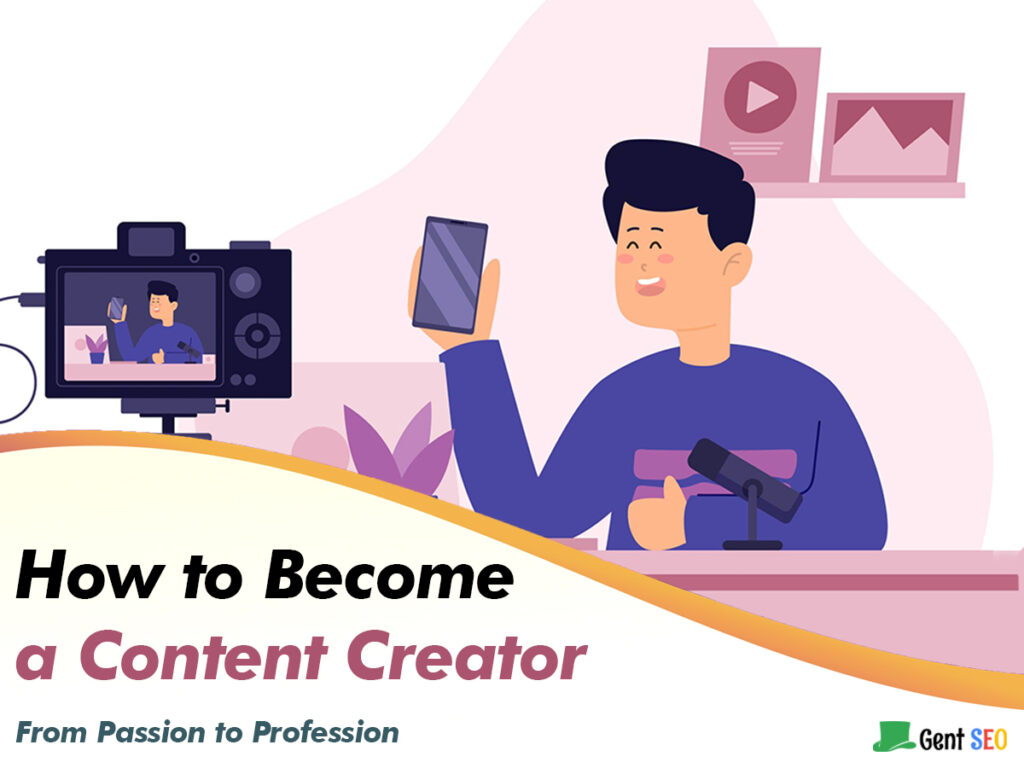From Passion to Profession: How to Become a Content Creator

Content creators are the storytellers of the digital age. They use their creativity and expertise to craft content that resonates with their audience. Whether it’s a travel blogger sharing their latest adventure, a YouTuber reviewing the newest tech gadget, or a podcaster discussing the latest trends in digital marketing, content creators are everywhere, shaping the way we consume information and entertainment.
What is a Content Creator?
Imagine you’re someone who loves sharing your thoughts, ideas, and experiences with the world. That’s essentially what a content creator does.
A content creator is an individual who produces and shares various forms of content, typically digital, to inform, entertain, or inspire an audience.
This can range from blog posts and videos to social media updates and podcasts. The goal is to engage with an audience, build a community, and often, to influence or educate them on specific topics.
Here is some statistics that may give you a better insight
| The estimated worth of the creator economy is $104.2 billion. |
| The creator economy market size is expected to double by 2027. |
| The creator economy has 207 million content creators worldwide. |
| The industry has 200 million active content creators. |
| The creator economy has over 2 million expert content creators. |
| Shopify is a leading company supporting the creator economy, with an annual revenue of $5.2 billion. |
(Source: linktr.ee & wpbeginner.com)
What Does a Content Creator Do?
Now, let’s talk about what a content creator actually does. The role can be quite diverse and multifaceted, depending on the niche and platform. As a content creator, you’re not just creating content; you’re also a researcher, a marketer, an editor, and sometimes even a community manager.
First and foremost, content creation involves producing engaging content. This could be writing blog posts, filming videos, recording podcasts, or creating social media updates. But it doesn’t stop there. You need to conduct thorough research to ensure your content is accurate, relevant, and up-to-date. This means staying on top of trends, understanding your audience’s interests, and continuously learning about your niche.
SEO optimization is another crucial aspect. As a content creator, you need to understand and implement SEO analysis best practices to increase your content’s visibility and drive traffic. This involves keyword research, optimizing your content for search engines, and using analytics to track performance and make improvements.
Editing and proofreading are also essential. Before you hit publish, you need to ensure your content is polished and free of errors. This means checking for grammar and spelling mistakes, ensuring your content flows well, and making sure it’s visually appealing.
Engaging with your audience is another key responsibility. This involves interacting with your followers through comments, messages, and social media. Building a community around your content is crucial for long-term success. It helps you understand your audience better and creates a loyal following.
Finally, you need to monitor your content’s performance. Using analytics tools, you can track how well your content is doing and use this data to refine your strategies and improve future content. This continuous cycle of creation, engagement, and improvement is what makes a successful content creator.
Content Creator Types with Examples
Content creators come in all shapes and sizes, each specializing in different types of content. Let’s explore some of the most common types and provide examples to illustrate each one.
Bloggers are perhaps the most traditional type of content creators. They write articles on specific topics, sharing personal insights and expertise. For example, a travel blogger might document their adventures, offering tips and recommendations for fellow travelers. They use their writing skills to paint vivid pictures of their experiences, making readers feel like they’re right there with them.
YouTubers create video content on platforms like YouTube. They might review products, share tutorials, or vlog about their daily lives. For instance, a tech reviewer might unbox and review the latest gadgets, providing detailed insights and opinions to help viewers make informed purchasing decisions. Their videos are often highly produced, with attention to detail in both content and presentation.
Podcasters produce audio content, often in the form of interviews or discussions. A podcast on digital marketing trends, for example, might feature industry experts sharing their insights and advice. Podcasters need strong communication skills and the ability to engage listeners through their voice alone. They often build a loyal audience who tune in regularly for new episodes.
Social Media Influencers use platforms like Instagram and TikTok to share lifestyle content and partner with brands. A fitness influencer, for example, might share workout routines, nutrition tips, and motivational content. They use their influence to inspire and educate their followers, often collaborating with brands to promote products that align with their niche.
Photographers capture and share visual content, often focusing on specific themes like nature, fashion, or events. A nature photographer might share stunning images of landscapes and wildlife, using their skills to highlight the beauty of the natural world. Their content is highly visual, relying on their ability to capture and edit photos that tell a story.
Key Platforms for Content Creators:
– YouTube
– Blogs & Websites
– TikTok
– Podcast Platforms
How to Become a Content Creator
So, how do you become a content creator? It’s a journey that involves several steps, and it’s important to approach it with a clear plan and a lot of passion.
- Identifying your niche
- Learning your audience
- Creating a content plan
- Producing high-quality content
- Promoting your content
- Engaging by building a community
- Analyzing & improving the content
First, identify your niche. Choose a topic you are passionate about and knowledgeable in. This will help you stay motivated and produce high-quality content. Your niche should be something you can talk about endlessly without getting bored. It could be anything from cooking to technology, fashion to fitness or sometimes you need to find the audience by Competitor Analyzing to find them in other websites that have the same contents. The key is to find something you love and can see yourself creating content about for a long time.
Next, learn about your audience. Understand who your target audience is and what they are interested in. This will guide your content creation process. Conduct surveys, engage with your audience on social media, and use analytics to gather insights. The better you understand your audience, the more effectively you can create content that resonates with them.
Then, create a content plan. Develop a strategy that outlines what type of content you will create, how often you will publish, and on which platforms. A content calendar can be incredibly helpful here. It allows you to plan your content in advance, ensuring you have a steady stream of content ready to go. Consistency is key in content creation, so having a plan helps you stay on track.
Once you have your plan, it’s time to produce high-quality content. Focus on creating valuable and engaging content that resonates with your audience. This means putting in the effort to make your content the best it can be. Whether it’s writing a blog post, filming a video, or recording a podcast, aim for quality over quantity. Your audience will appreciate the effort you put into creating something valuable.
After creating your content, you need to promote it. Use social media, SEO, and other marketing strategies to increase your content’s visibility. Share your content on multiple platforms, collaborate with other creators, and engage with your audience to build a community around your content. The more you promote your content, the more people will see it and engage with it.
Engagement is crucial, so make sure to engage with your audience. Build a community by interacting with your followers and responding to their feedback. This helps you build a loyal following and creates a sense of community around your content. Respond to comments, ask for feedback, and show appreciation for your audience’s support.
Finally, analyze and improve. Regularly review your content’s performance and make adjustments to improve your strategy. Use analytics tools to track your content’s performance, identify what’s working and what’s not, and make data-driven decisions to refine your approach. This skill becomes more important for the websites or companies that use Programmatic SEO technique for mass content producing. This continuous cycle of creation, engagement, and improvement is what makes a successful content creator.
What Skills Does a Content Creator Need?
To be successful, content creators need a diverse set of skills.
- Creativity
- Writing & editing skills
- SEO knowledge
- Technical proficiency
- Research skills
- Marketing and promotion skills
- Analytical skills
Let’s break down some of the most important ones.
Creativity is at the heart of content creation. The ability to generate fresh and engaging ideas is crucial. Whether you’re brainstorming topics for a blog post, coming up with video concepts, or thinking of new ways to engage your audience on social media, creativity is key. It’s what sets you apart from other creators and keeps your content interesting and engaging.
Writing and editing skills are also essential. Strong writing skills are needed to produce clear and compelling content, while editing skills ensure it is polished and free of errors. Whether you’re writing a blog post, scripting a video, or crafting a social media update, good writing is crucial. Editing is equally important, as it ensures your content is professional and polished.
SEO knowledge is another important skill. Understanding SEO principles helps you optimize your content for search engines, increasing its visibility and driving traffic. This involves keyword research, on-page optimization, and understanding how search engines rank content. SEO is a powerful tool for content creators, helping you reach a larger audience and grow your following.
Technical proficiency is also important. Familiarity with tools and software for content creation, such as video editing software, graphic design tools, and content management systems, is crucial. The more proficient you are with these tools, the more efficiently you can create high-quality content. This includes everything from editing videos and photos to managing your website and social media accounts.
Research skills are essential for ensuring your content is accurate and informative. The ability to conduct thorough research helps you create content that is well-informed and valuable to your audience. This involves finding reliable sources, fact-checking information, and staying up-to-date with trends and developments in your niche.
Marketing and promotion skills are also important. Knowledge of digital marketing strategies helps you promote your content and grow your audience. This includes understanding social media marketing, email marketing, and other promotional strategies. The more effectively you can market your content, the more people you can reach and engage with.
Finally, analytical skills are crucial for tracking your content’s performance and using data to refine your strategies. The ability to analyze content performance helps you understand what’s working and what’s not, allowing you to make data-driven decisions to improve your content. This involves using analytics tools to track metrics like views, engagement, and conversions, and using this data to inform your content strategy.
Final Thought
Becoming a content creator is a rewarding journey that allows you to share your passions and expertise with a larger audience. By understanding the various roles and responsibilities, honing the necessary skills, and consistently producing high-quality content, you can build a successful career in content creation.
If you’re geared up to dive deeper into this exciting world, discover more excellent articles at GentSEO, where we share insights and hints to help you be triumphant. You can also visit our SEO Content Service for extra information.




